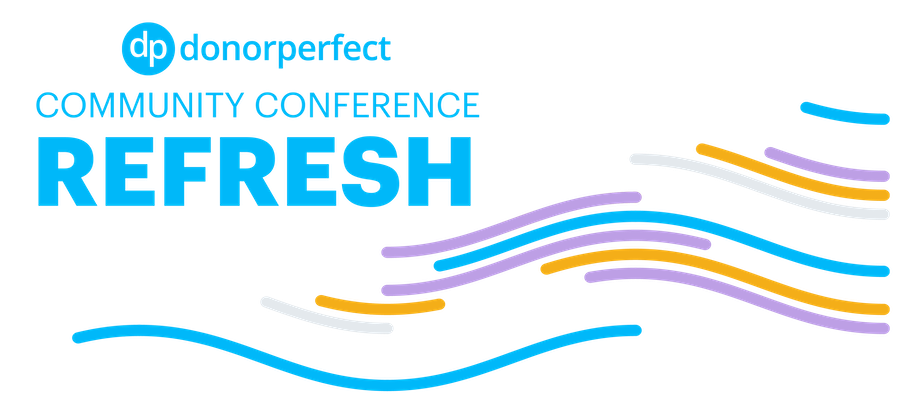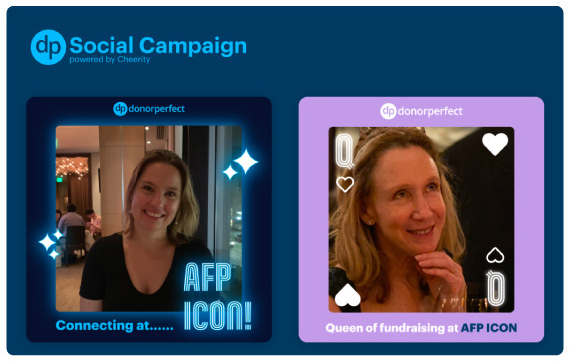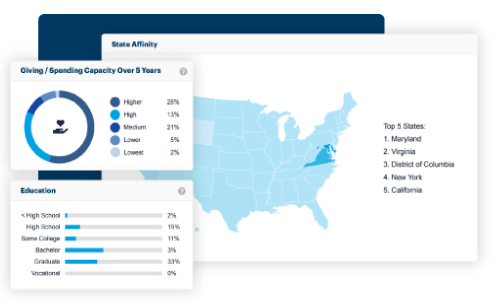Before becoming a renowned nonprofit leadership coach, and founder of the Nonprofit Leadership Lab, Joan Garry was the executive director of GLAAD, an LGBTQ+ nonprofit organization. Her session at the 2023 DonorPerfect Community Conference, Reigniting Innovation Within Your Organization, was an inspiring talk about how our nonprofit heroes can propel their vision forward and see their mission succeed. As a bonus, DonorPerfect clients have access to a special Nonprofit Leadership Lab offer.
Watch session recordings from the 2023 DonorPerfect Community Conference, including Reigniting Innovation Within Your Organization.

Here are 5 lessons we learned from Garry’s expertise.
Lesson 1: Bring intention and passion
During her presentation, Garry delves into five strategies that she believes have best guided her clients in bringing innovation (and success) to their nonprofits. The first of the five principles she shares is leading your nonprofit with intention.
Anyone who has worked in the nonprofit sphere for any length of time knows there’s too much that needs to be done and not enough time, people, or resources to get it done. Garry acknowledges this and stresses the importance of simply choosing to not do it all. Instead, decide what is most important, what will bring the greatest benefit to your cause, and focus on that. When you’ve decided what your focus should be, unleash your passion and offer your time and attention to those tasks.
Take-away exercise:
How do you determine what work is most important? This alone can be a difficult task. You may prefer to leave this in the capable hands of one or two people, but if you choose to make it a team effort, try this exercise with your colleagues. Each person will write what they believe should be a top priority on a notecard and will have five minutes to tell the group why they believe this initiative to be the most valuable.
After each person presents, one person will start by collecting all of the notecards and taping them to a wall in priority order, with the highest priority being at the top. Then each person will have the opportunity to move one notecard higher or lower on the list of priorities and speak to why they are making that change. This process will continue with each person being offered additional turns to move a card, or the option to pass if they are happy with the order of the initiatives.
Pro tip: Make sure data entry and other automated tasks don’t clutter your initiative board. Assign these tasks to a hard-working CRM and stop wasting your manpower on jobs that sophisticated software, like DonorPerfect, can help you with.

Lesson 2: Market your success
You want your board, volunteers, staff, and donors to be your biggest cheerleaders. In order for them to be the best possible brand ambassadors you could ask for, they need to know about the hard work you’re putting in and the innovations you’re making. As Garry so astutely attests, this is not best done through a newsletter.
Our audiences consume information quickly and in bite sizes. If you’re currently raising awareness of your work through regular monthly updates and emails, spend some time looking for new avenues to share your updates. Garry highlighted a client of hers who used their social media platforms to share their segment called Did You Knows. The nonprofit leader shared quick, easily shareable snippets of the work they were doing.
Take-away exercise:
Send out a request to all of your volunteers, board members, staff, etc., and ask them to share two things:
- What is their favorite part about your nonprofit?
- Why do they support your cause?
Ask them to share this on one of their social media platforms and tag your organization.
Pro tip: DonorPerfect has a donor acquisition tool called DP Social. This allows your supporters to post to social media platforms by including their pictures within a banner that you create. DP Social offers a wide variety of templates, so no design expertise is required.

Lesson 3: Reframe Fundraising
Asking for money is awkward and difficult. Inviting a friend to participate in a mission you are both passionate about is much easier. That’s how Garry encourages you to look at and approach fundraising. After all, if you are simply asking for money from someone who is not passionate about your cause, you’re asking the wrong person.
This was a sentiment that was echoed by a lot of the speakers at the DonorPerfect Community Conference. Spend your time, energy, and resources finding the right people to support your cause. With a smaller list to cultivate, you can create more meaningful interactions with each potential donor. And as Garry reminds us, these moments can be more about an invitation to work together to drive your mission forward and less about asking someone to complete a financial transaction.
Pro tip: DonorPerfect can help you cull your donor list and identify those with the most potential to support your work. DonorPerfect Insights gives you the information you need to better understand your donors and their motivations.

Take-away exercise:
Write two versions of the same appeal. In one appeal use language that “asks” a donor to make a donation and in the second version use language that asks a supporter to partner with you in your cause. Share with your team, highlighting the distinctions, and get your fundraisers familiar with using language that invites constituents in.
Lesson 4: Build a culture of storytelling
During her presentation, Garry shared a slide with a simple equation on it:
Credible messenger + Compelling story = Revenue
Your organization needs many credible messengers to spread the word. Board members, volunteers, and staff should all be ambassadors of your organization and each of them should feel comfortable telling the story of your nonprofit. Of course, each person may tell a different story or tell it in a different way and that’s perfect! Garry emphasized how important it is to build this into the culture of your organization and that means making time for this during staff meetings, volunteer orientations or service days, and board development.
Take-away exercise:
Get your team comfortable telling stories by trying different exercises during each gathering. At your next staff meeting, have each person share the story of how they got their names or nicknames with the team.
During an upcoming board meeting, try a story exchange. In this exercise, a person shares a story with another board member, then that board member adopts the story as their own and shares it with another person in the group.
Lesson 5: Build excitement about the destination
Oftentimes, the visions of our organizations can get lost in the mundane but overwhelming tasks of our day-to-day operations. This is especially true for our board members who have, as Garry points out, three main purposes:
- Risk management
- Problem-solving
- Imagining what’s possible
Of course, between risk management and problem-solving, frequently there is little time left over to imagine what is possible. It is vital to leave room for this each time your board convenes. This will keep your board members invigorated and bring your vision within reach. Don’t forget to share your excitement with those who support you, too. Your community wants to know what you believe is possible if enough people come together to make it happen.
Take-away exercise:
Create a vision board and display it at each board meeting. During each meeting spend 15 minutes at the start or end of the meeting discussing or adding to your vision board.







